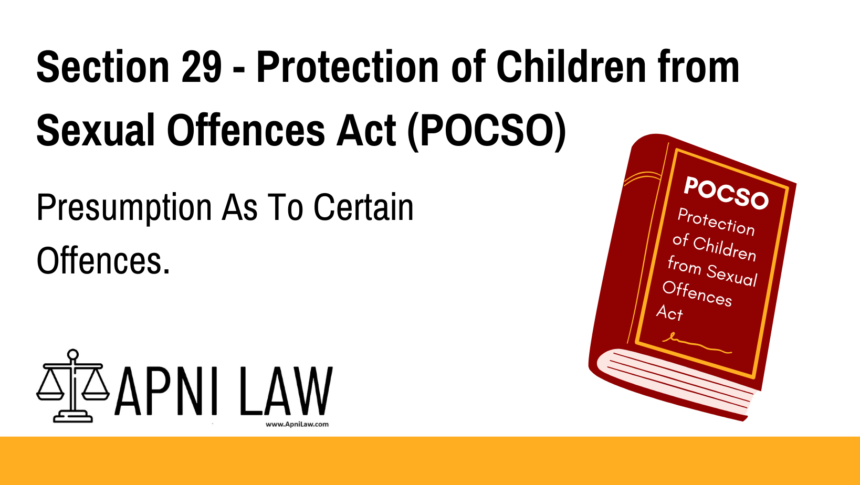Code: Section 29 – Protection of Children from Sexual Offences Act (POCSO)
Where a person is prosecuted for committing or abetting or attempting to commit any offence under sections 3, 5, 7 and section 9 of this Act, the Special Court shall presume, that such person has committed or abetted or attempted to commit the offence, as the case may be unless the contrary is proved.
Explanation of Section 29 POCSO
Section 29 of the POCSO Act creates a legal presumption of guilt in certain offences involving children. This provision shifts the burden of proof onto the accused when they are prosecuted for serious crimes such as:
- Penetrative sexual assault (Section 3)
- Aggravated penetrative sexual assault (Section 5)
- Sexual assault (Section 7)
- Aggravated sexual assault (Section 9)
In these cases, the law directs the Special Court to assume the accused committed the crime unless they prove otherwise.
This reversal of the burden of proof strengthens the legal protection given to children and emphasizes the seriousness of sexual offences against them.
Key Points
- The presumption applies only when someone is prosecuted under Sections 3, 5, 7, or 9.
- It includes attempts to commit or abet these offences.
- The accused must prove their innocence to rebut the presumption.
- This legal standard is designed to support victims and improve conviction rates in child sexual abuse cases.
Illustration
Example 1: Prosecution under Section 3
A man is charged with penetrative sexual assault. Since Section 3 is involved, the court presumes he committed the crime unless he provides strong evidence showing otherwise.
Example 2: Attempted Aggravated Sexual Assault
A school employee tries to commit an offence listed under Section 9. During the trial, the Special Court presumes guilt and expects the accused to prove they did not attempt the act.
Example 3: Abetment by a Relative
If a person encourages or helps someone commit a sexual offence under Section 5, the court presumes they are guilty of abetment unless they prove their innocence.
Common Questions and Answers on Section 29 POCSO
- What does “presumption of guilt” mean in Section 29? It means the court assumes the accused committed the offence unless they can prove otherwise.
- Which sections does this presumption apply to? It applies to offences under Sections 3, 5, 7, and 9 of the POCSO Act.
- Is this rule common in other criminal laws? No. In most criminal cases, the burden is on the prosecution. POCSO reverses it in serious child abuse cases to protect children.
- Does this violate the principle of “innocent until proven guilty”? While it departs from the usual standard, courts have upheld its validity due to the vulnerable status of children and the sensitive nature of such offences.
- Can the accused still be acquitted? Yes. If the accused presents credible evidence or creates reasonable doubt, the court may acquit them.
Conclusion
Section 29 of the POCSO Act provides stronger safeguards for children by shifting the burden of proof to the accused in severe sexual offence cases. This legal presumption ensures that victims receive better protection and that offenders are more likely to be held accountable unless they can clearly establish their innocence.
To explore more on child protection laws, visit ApniLaw.








